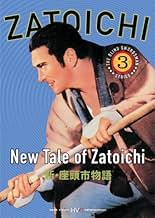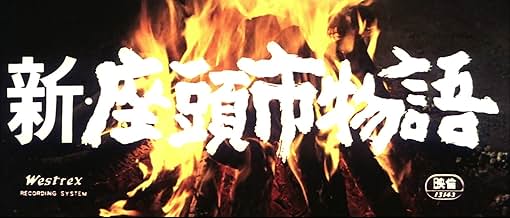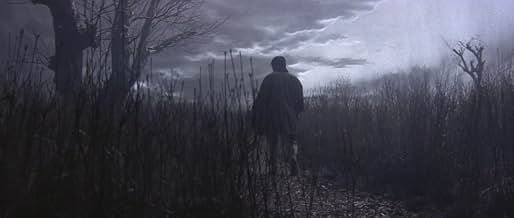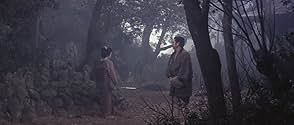AVALIAÇÃO DA IMDb
7,3/10
2,5 mil
SUA AVALIAÇÃO
Adicionar um enredo no seu idiomaWishing to find peace, Zatoichi travels to his old village but only finds trouble when he ends up in a love triangle and finds old scores have followed him home.Wishing to find peace, Zatoichi travels to his old village but only finds trouble when he ends up in a love triangle and finds old scores have followed him home.Wishing to find peace, Zatoichi travels to his old village but only finds trouble when he ends up in a love triangle and finds old scores have followed him home.
- Direção
- Roteiristas
- Artistas
- Prêmios
- 1 indicação no total
- Direção
- Roteiristas
- Elenco e equipe completos
- Produção, bilheteria e muito mais no IMDbPro
Avaliações em destaque
The following review is an extract from the book "Shintaro Katsu´s Zatoichi: Complete guide to all movies", which is now available on Amazon.
In this third part of the Zatoichi saga, the protagonist (played by Shintaro Katsu) wants to change some things of his past, leave behind the Yakuza and correct his mistakes, returning to the town where he grew up. On the way he meets a former schoolmate, who acts as a musician singing and playing the shamisen. His childhood friend is with his wife and young son. The four stay in an inn for the night, and as Ichi sings a song with the shamisen, the place is assaulted by a gang of hooded thieves. So as not to endanger his friends and other guests, Zatoichi does not resist for the time being, and prefers the criminals to believe that he is nothing more than a poor, blind masseur (when in reality he is a prodigious swordsman, even though he lacks a sense of vision).
(...)
The third part of the Zatoichi saga has a slight philosophical background that is somewhat reminiscent of Taoism (the action of non-doing, or wu-wei). Zatoichi's apparent passivity towards Kanbei's brother, who wants revenge, provokes new reactions and events. The attitude of the protagonist is to renounce his past life and become a new man by returning to the origins, to the village where he grew up. There he will discover with disappointment that the one who trained him in the arts of fencing, the one to whom he owes his knowledge in the handling of the sword, far from being a venerable master, is actually a despot who does not hesitate to mercilessly murder unarmed people and in inferior conditions, either as a consequence of his uncontrollable anger or simply for money and material goods, in cold blood. Much more noble and honorable is the young yakuza. After verifying this, Zatoichi decides to continue his wandering life, renounces family and marriage and continues on his way with the firm intention of never returning to his village.
In this third part of the Zatoichi saga, the protagonist (played by Shintaro Katsu) wants to change some things of his past, leave behind the Yakuza and correct his mistakes, returning to the town where he grew up. On the way he meets a former schoolmate, who acts as a musician singing and playing the shamisen. His childhood friend is with his wife and young son. The four stay in an inn for the night, and as Ichi sings a song with the shamisen, the place is assaulted by a gang of hooded thieves. So as not to endanger his friends and other guests, Zatoichi does not resist for the time being, and prefers the criminals to believe that he is nothing more than a poor, blind masseur (when in reality he is a prodigious swordsman, even though he lacks a sense of vision).
(...)
The third part of the Zatoichi saga has a slight philosophical background that is somewhat reminiscent of Taoism (the action of non-doing, or wu-wei). Zatoichi's apparent passivity towards Kanbei's brother, who wants revenge, provokes new reactions and events. The attitude of the protagonist is to renounce his past life and become a new man by returning to the origins, to the village where he grew up. There he will discover with disappointment that the one who trained him in the arts of fencing, the one to whom he owes his knowledge in the handling of the sword, far from being a venerable master, is actually a despot who does not hesitate to mercilessly murder unarmed people and in inferior conditions, either as a consequence of his uncontrollable anger or simply for money and material goods, in cold blood. Much more noble and honorable is the young yakuza. After verifying this, Zatoichi decides to continue his wandering life, renounces family and marriage and continues on his way with the firm intention of never returning to his village.
'New Tale Of Zatoichi (1963)' sees its eponymous blind swordsman/masseur return to the town in which he was trained, followed by his reputation and the repercussions of the prior movie's events. Once again, it's a relatively meditative character study at heart. With flashes of fast-paced, decisive action and a background plot focused on a kidnapping, the picture ebbs and flows until it reaches its melancholic yet explosive finale. It's a little bit scatterbrained and doesn't have the strongest of central threads; the closest thing to a proper through-line is probably an ill-fated romance that brings out the best in Zatoichi but the worst in his master. In general, the movie is enjoyable. Plus, its shift to colour has little impact on its overall look and feel. Even if it isn't as solid as its two predecessors, it's still well-made and engaging. 7/10
10R0BTRAIN
The third installment of the Zatoichi series is the best one I have ever seen. While not as exciting as some of the other action packed entries (Chest of Gold, Zatoichi's Revenge) in terms of character development this film had the most impact on me. The stakes just seem to be higher in this entry than in most. Make no mistake, Ichi's life is on the line in EVERY other installment, but this centers on how Ichi really wants to quit his swordsman lifestyle and take a wife. To live the rest of his days in peace is all he wants and that is taken away from him. Ichi is forced to not only see how terrible the people he trusts can be, but how much he brings upon himself. This film really drives home how much Ichi loses each time he takes a life. A new friend, a new aquaintence or a new lover is almost always instantly taken away from him, either by an enemies hands or by his own. But the single greatest scene in this film is not any of the sword fights, like in other entries, the best scene is the evens/odds scene in this film. If you're a fan of this series at all please see this entry.
In terms of plot, the third Zatoichi is no better than the previous two films. Cinematically, it is a vast improvement. Every shot is fantastic, and the score is as good as it gets. The change in Director really shows. Oh, and it's in colour. I do love black and white photography, but the colour adds so much in a film like this.
Like the previous film, it's a little melodramatic in places, but it works in the films favour. The lead actor is as great here as he was the last two times round, and the actor playing his master is perfectly cast. There is a lot of character development in this one. A little more about Zatoichi's past is revealed, as is his desire to leave the yakuza life, and the shame he feels for his past deeds. As someone else said, there is a great scene in which he plays a game of odds and evens. Maybe I'm just a softy, but after a scene like that I find it impossible not to rank this film higher than the previous two. I love it when villains have a change of heart. Very impactful scene. Admittedly, the character Zatoichi befriends in the first film and their relationship is stronger overall... but that odds and evens scene... Love it.
This film also has a great ending; a far cry from the abrupt ending of the previous, which felt as though they ran out of time and cut it short. I'm all for stylish abrupt endings (Sword of Doom), but the second film's ending felt almost accidental, almost as if they had an allocated time slot and were running over. This one ends with style. In fact, for a film like this I'd say it's a perfect ending (though not as good as Sword of Doom's ending, obviously). In a way it reminded me of some of the Sharpe (Sean Bean series) endings, and that non-detrimental melodrama reminded me of Sharpe, too.
I've not seen all the films in the series yet. I'm working my way through and rating them as I go, but so far Zatoichi 3 is the clear winner. Stylish and impactful.
EDIT - I'm now up to the ninth film. There have been films that surpasses this one overall, but I have to add that so far this film is still the best in terms of visuals and cinematography. Every shot is fantastic, so much so that the photo used for the actor is a still from this film.
Like the previous film, it's a little melodramatic in places, but it works in the films favour. The lead actor is as great here as he was the last two times round, and the actor playing his master is perfectly cast. There is a lot of character development in this one. A little more about Zatoichi's past is revealed, as is his desire to leave the yakuza life, and the shame he feels for his past deeds. As someone else said, there is a great scene in which he plays a game of odds and evens. Maybe I'm just a softy, but after a scene like that I find it impossible not to rank this film higher than the previous two. I love it when villains have a change of heart. Very impactful scene. Admittedly, the character Zatoichi befriends in the first film and their relationship is stronger overall... but that odds and evens scene... Love it.
This film also has a great ending; a far cry from the abrupt ending of the previous, which felt as though they ran out of time and cut it short. I'm all for stylish abrupt endings (Sword of Doom), but the second film's ending felt almost accidental, almost as if they had an allocated time slot and were running over. This one ends with style. In fact, for a film like this I'd say it's a perfect ending (though not as good as Sword of Doom's ending, obviously). In a way it reminded me of some of the Sharpe (Sean Bean series) endings, and that non-detrimental melodrama reminded me of Sharpe, too.
I've not seen all the films in the series yet. I'm working my way through and rating them as I go, but so far Zatoichi 3 is the clear winner. Stylish and impactful.
EDIT - I'm now up to the ninth film. There have been films that surpasses this one overall, but I have to add that so far this film is still the best in terms of visuals and cinematography. Every shot is fantastic, so much so that the photo used for the actor is a still from this film.
Usually long film series see a gradual development or deconstruction of the main character simply because either the character changes or the environment does. Most often our heroes are marched through various situations, numerous more often than not, and only when the ticket sales start to diminish there's usually a twist in the hero's personality or identity.
There's a third way, too. It has to do with the filmic problem of presentation, and usually this happens when the film is made during a historically significant technological paradigm shift. Sound was one, and nowadays it's most likely 3D, although more because of the commercial powers behind the technology. In the 1960s it was colour.
With Zatōichi its introduction in this third film becomes deliciously ironic, since in the first two films there have been several japes different people play on Ichi because he's blind. In those moments we, the audience, have been able to see it with them, making us part of the bad guys' gang as well. This cinematically fruitful branch of narrative play extends here to the very form of the film itself – its colour.
As a colour film this a very beautiful one. It's more inclined towards the subdued than the showy, and that's commendable. It's also more interested in characterization, really casting the second film in more realistic light as an afterthought. What's so striking is that while it's customary to have the hero denounce his craft and want to lead a normal life, it's usually fluff that lasts only a while. Not so here: Ichi really wants to quit, and promises to. It's made feasible, it makes sense. It feels like the right thing to do. But still we know that won't happen, that the torment will continue, and in part that's why we cheer for Ichi, that he might go on. They manage to make Ichi's torment our own. It really is expertly handled.
Among the best in the series so far.
There's a third way, too. It has to do with the filmic problem of presentation, and usually this happens when the film is made during a historically significant technological paradigm shift. Sound was one, and nowadays it's most likely 3D, although more because of the commercial powers behind the technology. In the 1960s it was colour.
With Zatōichi its introduction in this third film becomes deliciously ironic, since in the first two films there have been several japes different people play on Ichi because he's blind. In those moments we, the audience, have been able to see it with them, making us part of the bad guys' gang as well. This cinematically fruitful branch of narrative play extends here to the very form of the film itself – its colour.
As a colour film this a very beautiful one. It's more inclined towards the subdued than the showy, and that's commendable. It's also more interested in characterization, really casting the second film in more realistic light as an afterthought. What's so striking is that while it's customary to have the hero denounce his craft and want to lead a normal life, it's usually fluff that lasts only a while. Not so here: Ichi really wants to quit, and promises to. It's made feasible, it makes sense. It feels like the right thing to do. But still we know that won't happen, that the torment will continue, and in part that's why we cheer for Ichi, that he might go on. They manage to make Ichi's torment our own. It really is expertly handled.
Among the best in the series so far.
Você sabia?
- CuriosidadesThis is the first Zatoichi movie to be shot in colour.
- ConexõesFeatured in Best in Action: 1963 (2019)
Principais escolhas
Faça login para avaliar e ver a lista de recomendações personalizadas
- How long is New Tale of Zatoichi?Fornecido pela Alexa
Detalhes
- Data de lançamento
- País de origem
- Idioma
- Também conhecido como
- New Tale of Zatoichi
- Empresa de produção
- Consulte mais créditos da empresa na IMDbPro
- Tempo de duração
- 1 h 31 min(91 min)
- Proporção
- 2.35 : 1
Contribua para esta página
Sugerir uma alteração ou adicionar conteúdo ausente



























